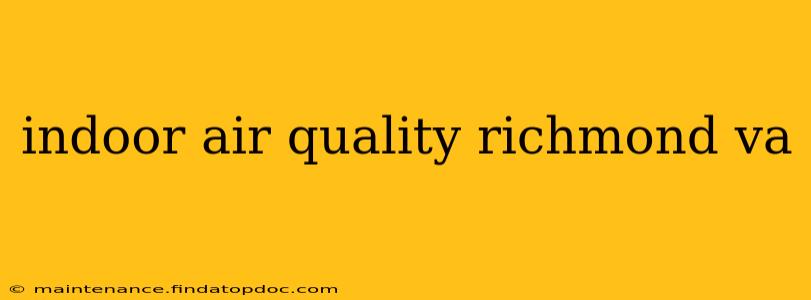Richmond, VA, boasts a rich history and vibrant culture, but the city's older buildings and sometimes humid climate can present challenges to indoor air quality (IAQ). Maintaining healthy indoor air is crucial for the well-being of residents and businesses alike. This comprehensive guide explores IAQ concerns in Richmond and offers solutions for cleaner, healthier breathing.
What are the common indoor air quality problems in Richmond, VA?
Richmond, like many older cities, faces IAQ challenges stemming from aging infrastructure. Older homes may contain asbestos or lead-based paint, releasing harmful particles into the air. The city's humidity levels can also contribute to mold growth, especially in poorly ventilated areas. Furthermore, pollen from the region's abundant trees and plants can easily infiltrate homes, triggering allergies and respiratory issues. Finally, traffic congestion can contribute to elevated levels of outdoor pollutants that seep indoors.
How does humidity affect indoor air quality in Richmond?
Richmond's humidity levels, particularly during warmer months, create a breeding ground for mold and mildew. These fungi thrive in damp environments, releasing spores that can trigger allergic reactions, asthma attacks, and other respiratory problems. High humidity can also exacerbate existing respiratory conditions and create an uncomfortable, stuffy atmosphere. Proper ventilation and dehumidification are essential to mitigate the negative impact of humidity on IAQ.
What are the sources of indoor air pollution in Richmond homes and businesses?
Indoor air pollution in Richmond stems from various sources:
- Biological pollutants: Mold, mildew, dust mites, pet dander, and pollen are common culprits.
- Chemical pollutants: Volatile organic compounds (VOCs) from cleaning products, paints, and furniture; radon gas from the ground; and combustion byproducts from gas stoves and furnaces.
- Particulate matter: Dust, smoke, and other fine particles.
- Building materials: Asbestos and lead-based paint in older structures.
How can I improve indoor air quality in my Richmond home?
Improving IAQ in your Richmond home requires a multi-pronged approach:
- Regular cleaning: Vacuuming, dusting, and mopping frequently to remove dust mites, pet dander, and other allergens. Use HEPA filters on your vacuum.
- Proper ventilation: Open windows when weather permits, and use exhaust fans in kitchens and bathrooms to remove moisture and pollutants.
- Air purifiers: Consider using air purifiers with HEPA filters to remove airborne particles.
- Mold remediation: Address any mold or mildew problems immediately. For significant infestations, professional mold remediation is necessary.
- Regular HVAC maintenance: Schedule annual maintenance for your heating, ventilation, and air conditioning (HVAC) system to ensure proper filtration and airflow. Consider upgrading to a high-efficiency system with improved filtration.
- Radon testing: Test your home for radon gas, a colorless, odorless, and radioactive gas that can seep into buildings. Mitigation systems are available if high levels are detected.
What are some tips for businesses to improve indoor air quality in Richmond?
For businesses, maintaining optimal IAQ is crucial for employee health and productivity. Strategies include:
- Regular HVAC filter changes: Change filters frequently, particularly in high-traffic areas.
- Improved ventilation systems: Ensure adequate ventilation to dilute pollutants and introduce fresh air.
- Air purification: Install air purification systems with high-efficiency particulate air (HEPA) filters to remove airborne contaminants.
- Regular cleaning and maintenance: Develop a comprehensive cleaning schedule to address dust, debris, and allergens.
- Employee education: Educate employees about IAQ issues and the importance of proper hygiene practices.
- Source control: Identify and eliminate sources of indoor air pollution, such as cleaning products, printers, and copiers.
By addressing these issues proactively, Richmond residents and businesses can significantly improve their indoor air quality and create healthier, more productive environments. Remember, consulting with IAQ professionals can provide personalized solutions and ensure a cleaner, safer living and working space.
